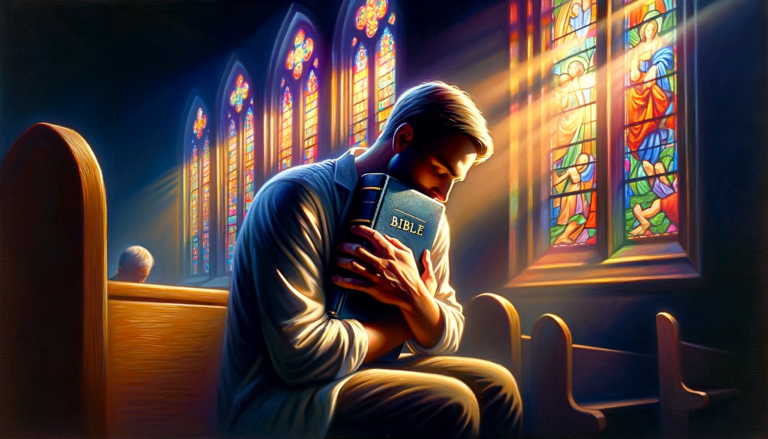What is a Bible Scholar?
Imagine someone who spends lots of time studying the Bible, just like how a scientist studies stars or plants. This person is called a Bible scholar. They read the ancient words in the Bible and try to understand what they mean for people today.
They learn about history and cultures from long ago to help make sense of it all.
Bible scholars use special ways of thinking to dig deeper into these old stories. Sometimes, they write books or create websites to share what they discover. Their ideas can be different because they don’t always follow one set way of seeing things.
To become one, you often need to study a lot after high school, learning things like languages and about places around the world. Being careful and fair with their work is very important for them too.
These scholars can light up new understanding about the Bible’s messages, which helps everyone think about it in fresh ways. Societies that love the Bible also play a big part in this by helping with research and sharing knowledge.
Ready to find out more? Let’s take an interesting walk through what being a Bible scholar means!
Definition of a Bible Scholar
Imagine diving into a sea of ancient texts, where every ripple and wave is a verse or parable waiting to reveal its secrets. This is the realm of the Bible scholar, an intrepid explorer dedicated to deciphering and understanding the rich tapestry of narratives that make up the biblical corpus.
These scholars don’t just read words; they unlock worlds, peering through the lens of history, culture, and language to grasp the heart of what has shaped countless generations—this is their definition.
Advanced study in the Bible
Bible scholars dive deep into the Bible. They spend years learning about its messages, stories, and lessons. To do this, they read a lot and think hard about what the Bible says and means.
They look at every part of it, from Genesis to Revelation, including all the verses in between.
These experts use special tools like historical facts and old languages to get a better grasp of the Bible’s world. Understanding ancient Hebrew or Greek can unlock secrets hidden in old texts for ages.
This helps them explain things better for everyone who wants to learn about God’s word.
Distinction in the field of biblical studies
Bible scholars stand out because they really dig deep into the Bible. They use tools from many fields like history, language, and culture to understand what’s written in the Scriptures.
Imagine a detective looking for clues in an ancient book – that’s kind of what these experts do every day. They look at every word, check old writings, and even study how people lived long ago to get the full picture.
They also need sharp minds to tackle tricky problems about the texts. Sometimes two parts of the Bible seem to clash or a part just seems odd today. The scholars work hard to make sense of this so everyone can learn from it.
Their work is super important for understanding religious beliefs around the world.
Next up is learning how someone becomes one of these dedicated Bible detectives!

The Role of a Bible Scholar
Imagine a detective, meticulously sifting through clues of ancient texts, piecing together the cultural puzzles that frame the world’s most famous book. A Bible scholar delves into scripture with equal parts reverence and rigor, dissecting verses to uncover not just their spiritual essence but also how they fit into the grand tapestry of history.
Interpretation of biblical texts
Bible scholars dig deep into the old and new pages of Scripture like detectives on a mission. They use their knowledge of history, languages, and culture to pull out the secrets locked in ancient words.
Think of them working with a giant puzzle where every piece is a verse or story from long ago. These experts turn those pieces around, look at them from all sides, and put them together until they see the big picture.
Their work helps us understand tough parts in the Bible that might seem strange or confusing at first glance. For example, imagine reading about Jesus walking on water or David fighting Goliath without knowing anything about miracles or slingshots.
A scholar can explain why these stories matter by diving into hermeneutics—the art of interpreting sacred texts—to reveal not just what was written but why it was important for folks back then and for us today!
Contextual understanding of biblical history
Bible scholars dig deep to find out what life was like long ago. They want to know how people back then thought and lived. This helps them understand the Bible better. It’s like being a detective in history! They look at old bones, pots, and writings to get clues.
Knowing the real story behind Bible stories is a big deal for these scholars. They ask questions about everything: What did that word mean back then? Who was king when this happened? Why did they do things that way? It’s not just about what the words say; it’s finding out why they say it that way.
Bible scholars use all this knowledge to make sense of ancient messages for today’s world.
Application of diverse disciplines to the study of the Bible
Understanding the history behind biblical events is just one piece of the puzzle. To fully grasp what’s in the Bible, scholars don’t just stick to old ways. They bring in ideas from different areas like art, language, and culture.
This mix helps them see new things in texts about Jesus Christ or lessons from Proverbs.
Bible experts look at ancient writings and use tools from subjects such as sociology and philosophy. They dive into old languages like Hebrew and Greek to catch every nuance of meaning.
By looking at how people lived long ago, they can better explain stories and sayings that might seem strange today. It’s like being a detective with an ancient map, piecing together clues to uncover secrets from times when kings like Solomon ruled or when Paul wrote his letters.
Using this broad toolset has shed light on parts of the New Testament that were once not fully understood. Thanks to these scholars, we now have deeper insights into everything from creation stories to visions of end times seen by John in the Book of Revelation.

How to Become a Bible Scholar
Diving headfirst into the ocean of ancient texts and theological conundrums isn’t for the faint of heart, but for those with a thirst for sacred knowledge, becoming a Bible scholar is akin to unearthing hidden treasures.
You’ll need more than just a shovel; it’s about immersing yourself in languages that might seem as cryptic as hieroglyphics and wrestling with existential questions that have puzzled minds far wiser than ours for millennia.
Academic study and research
Bible scholars spend a lot of time reading and thinking about the Bible. They work hard to understand every part of it.
- Study at a college or seminary: This is where you learn about the Bible in depth. You might get a degree like Master of Divinity or Master of Arts in Theology.
- Reading old writings: Scholars read texts from long ago, like the Dead Sea Scrolls, to learn more.
- Learning many languages: To read ancient texts, scholars learn languages like Hebrew, Greek, and Aramaic.
- Dig into history: They look at what life was like when the Bible was written. This helps them understand the stories better.
- Use different school subjects: Biblical research uses things you learn in other classes, too. Like digging up old things (archaeology) or studying people and cultures (anthropology).
- Write papers and books: Scholars share what they learn by writing their own papers. Sometimes these are called commentaries or journal articles.
- Debate with others: Bible scholars talk a lot with each other. They share ideas to figure out tough questions about the Bible.
- Teach students: Many scholars teach at colleges or special schools for religion called seminaries.
Commitment to responsible scholarship
Taking your work seriously is a big part of being a Bible scholar. You study hard and double-check everything you say about the Bible to make sure it’s true. This means young scholars have to be very careful with their words, and those who’ve been doing this longer must stick to strong moral rules.
It’s like holding a map for others; you need to guide them well without leading them off track.
Bible scholars share their findings so people can talk about them and ask questions. They want everyone to learn more, so they open up the floor for healthy debates. After all, getting it right matters more than just having an answer.
Leading on from here, let’s explore how these scholars light up the world of biblical truth!

The Impact of Bible Scholars
Bible scholars often serve as the detectives of divine dialogue, piecing together ancient texts to shed light on spiritual mysteries and ethical enigmas. Their cerebral sleuthing not only deepens our understanding of sacred scriptures but also fuels spirited discussions across pews, podiums, and even pub tables about the intricacies of faith.
Illuminating and educating on Biblical Truth
Bible scholars are like detectives with ancient maps and old letters. They dig deep into the past and shine light on truths that have been hidden for ages. With their work, they help us see what life was like in Bible times and how people thought about God back then.
They use all sorts of tools to teach us about the Bible’s messages. From dusty scrolls in languages long forgotten, to stories passed down through generations, they piece together clues.
This helps everyone understand better what it means to live a good life following God’s Word. Bible scholars make sure we’re not lost in translation when it comes to important lessons from Matthew 4:4 or any other verse that speaks to our hearts.
Contributing to the field of biblical studies
Bible scholars use different ways to dig deep into the Bible. They look at ancient writings and what was happening in history when the Bible was written. This helps them understand the words better.
Scholars also study old things found in the ground like bones and pots to check if stories from the Bible are true.
They make sure to share what they learn with others, too. These scholars talk about their ideas, write books, and teach classes. Their work helps people see new meanings in Bible stories they have read many times before.
Studying languages that were used a long time ago is important for these experts because it gives clues about hidden messages in texts that might be missing or changed after many years.
By doing all this hard work, Bible scholars help everyone who wants to know more about faith and history find answers.
Next up is understanding how societies dedicated to studying the Bible play a role in this fascinating field of research!
The Role and Impact of Bible Societies in Biblical Scholarship
Bible Societies have a special job. They work hard to make sure people can read the Bible in their own language. This is important because it helps more people understand what the Bible says.
These societies also help by making new copies of the Bible that are easier to read and share.
The impact they have on biblical scholarship is huge. Scholars use the texts from these societies to study the history and messages in the Bible. Thanks to this, we know more about how people used to live and think long ago.
It’s like finding pieces of a big puzzle that shows us how stories in the Bible fit with events from history.
These groups don’t just look at words; they dig deep into where those words came from. They study old languages and find out how different books of the Bible were put together. With their help, scholars can explain things better when teaching or writing about the Bible’s message.
Conclusion
A Bible scholar is like a deep-sea diver in the ocean of God’s Word. They plunge into ancient texts, seeking pearls of wisdom from long ago. With their map of knowledge, they navigate through history and language, helping us understand the treasure we hold in our hands.
Their work lights up the pages with new meaning, turning old stories into guides for life today. Picture them as detectives uncovering truths that make those ancient words dance again in our modern world!
To further explore the intersection of faith and scholarship, delve into the supportive world of Bible Societies and their role in advancing biblical studies.
FAQs
1. Who is a Bible scholar?
A Bible scholar is someone who studies the Bible deeply. They learn about things like the history of Jesus, different parts of the Bible, and what Christians believe.
2. What do Bible scholars study?
Bible scholars look at many parts of the Bible, such as the Old Testament and New Testament. They also study how it was written in Hebrew or Greek and think about what these writings meant long ago.
3. Can anyone become a Bible scholar?
Yes! If you want to study the history and meaning of biblical texts deeply, you can go to grad school for religious studies or theology!
4. Why do people study to be a Bible scholar?
People choose to be a bible scholar for lots of reasons—like wanting to understand God’s word better or teaching others in schools or churches.
5. Are there different kinds of bible scholars?
There are many kinds: some are called evangelical, liberal, critical or skeptical scholars based on how they think about and explore the text.
6. What do bible scholars say about how old stories were shared?
Bible Scholars often talk about an “oral tradition,” which means that stories like those found in Psalms were passed by word-of-mouth before being written down.






